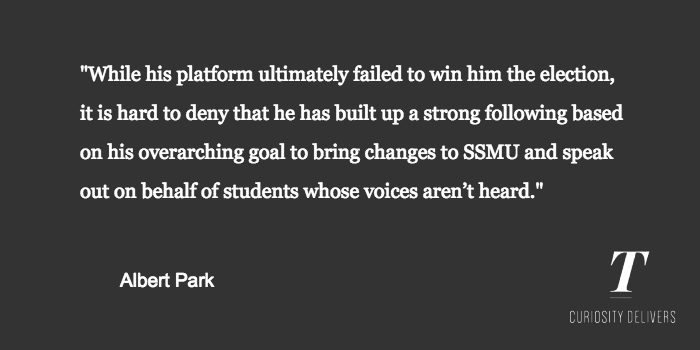The resignation of the Students’ Society of McGill University (SSMU) Vice-President (VP) Internal Lola Baraldi in October came with a silver lining for the ever-eroding world of McGill politics. In the midst of the confusion came the return of Alexei Simakov—known for running a close election against current SSMU President Kareem Ibrahim in March. He rose like a phoenix out of the ashes, this time campaigning to fill the vacant VP Internal position. His campaign, while ultimately unsuccessful and overshadowed by scandal, brought to light the urgent needs for reform of SSMU’s electoral process as well as the importance of competitive elections with multiple candidates.
SSMU has announced yet another byelection, with polling to beginning this Thursday, Nov. 26 and results announced on Friday, Nov. 27. Simakov did not pursue a second nomination; instead, six fresh candidates are making their bid.
While this marks an end to Simakov’s controversial ventures for SSMU candidacy, the impact he has left on student politics of McGill will live on. In his campaign for the VP Internal position, Simakov brought forward admirable—albeit unrealistic—proposals in his platform. One such recommendation was electoral reform; Simakov proposed to establish enforced rules about campaigning and set up clear guidelines for candidates. While both the McGill Daily and the Tribune expressed that this fell outside the portfolio of the VP Internal position, it is an appealing proposition. While it may not be advisable for the new candidates for the position to make similar promises, they may put pressure on SSMU to lay the groundwork for reform; SSMU must establish clear rules around electoral practices to prevent the drama from overshadowing the platform again. The lesson is most potent in the aftermath of an election marred by accusations, scandal, and extensive online drama from all sides; all candidates must be conscious of how to prevent similar degeneration in the future.
In light of an unsuccessful election and a hastily announced second byelection, the importance of having more than one candidate for a SSMU executive position has also become very evident. Regardless of the reason behind it, the result of an uncompetitive election with no winner was evident: A prolonged election period hindered the SSMU and further entrenched students’ feelings of disillusionment. Interestingly, the second byelection is a drastic change to the trend of sparsely populated ballots in SSMU elections. Only time will tell if this is a positive step towards electoral processes that are more effectively able to present a variety of platforms that better appeal to the wide array of voices on campus.
In regards to representing the student body of McGill, Simakov’s campaigns embodied the value of a contrarian candidate. Simakov was quick to voice his displeasure with the perceived one-sided left-leaning makeup of SSMU, which is a clear concern for a significant portion of McGill’s student body. While his platform ultimately failed to win him the election, it is hard to deny that he has built up a strong following based on his overarching goal to bring changes to SSMU and speak out on behalf of students whose voices aren’t heard.
The candidates of the upcoming byelection should consider Simakov’s legacy as they commence their campaigns. Perhaps they will not incorporate his campaign, but they may take heed of the lesson—be realistic, focus on the portfolio at hand, and play a clean game. Until Elections SSMU and Council are able to entrench reform, candidates can be the starting point of building a stronger relationship between the McGill community and their government.
Do you have thoughts on the representativeness of SSMU, or elections to SSMU? Send a message to [email protected].










